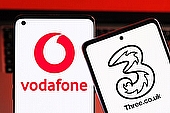Home > TV & Broadband > News > Samsung's 8K TV is coming to the UK
Samsung's 8K TV is coming to the UK
The first 8K TV will go on sale later this month, but is there any point in investing?
Samsung have announced that they will launch the UK's first ever 8K TV later this month.
Available to pre-order from 3rd October 2018, the Q900R was first seen at tech shows earlier this year. Deliveries are expected to take place from the 17th October onwards.
Price start at an eye popping £4,999.99 for the 65-inch version, and for the 75-inch version, it's £6,999.99. There is also a monster 85-inch model, but this is yet to be priced on the Samsung UK website. In the US, it's on sale for $14,999.99 (£11,456).

What is 8K?
While many households were still getting their heads around the idea of a 4K TV, the manufacturers have been busy working on the next must-have upgrade. The industry enjoys big numbers, so it was only a matter of time before 8K hit the shops.
8K describes the number of horizontal pixels (or thereabouts) that TVs of this nature have. In a 4K TV, the pixels measure 3,840 by 2,160. 8K has 7,680 by 4,320.
Previously, TVs have been called by the vertical pixels, such as 1080p (with p standing for pixels). As screens grew, the industry chose to round up the horizontal number of pixels to the nearest thousand instead, as they felt 2160p was too forgettable.
In essence, each upgrade doubles the number of pixels on the screen, making for a clearer, sharper image.
To confuse the issue even more, both 4K and 8K can be referred to as 'Ultra High Definition' or UHD. This is because the term 'UHD' is a generic term relating to TVs which are fit for the future, containing things like HDR, high frame rates and wide colour spectrums.
Because of the additional pixels involved, screen sizes have to be scaled up for the human eye to even start to discern the quality. Even with Samsung's 85-inch behemoth, viewers would have to be sitting within two and a half feet of the screen to notice any difference between this and 4K.
What can you watch on it?
Right now, there is no 8K content. Not from streaming services or TV operators or anywhere.
The likelihood of it coming anytime soon is pretty slim too. The amount of data generated by 8K resolution would be huge, requiring a large amount of bandwidth and highly efficient compression systems to deliver it.
In the future, more Hollywood blockbusters will almost certainly be filmed in 8K. In fact, Guardians of the Galaxy 2 was filmed using the RED Weapon 8K camera. However, it was only released in 4K.
The forthcoming Tokyo Olympics, scheduled for 2020, will be broadcast in 8K. the downside is, the broadcast will only be shown in Japan.
In reality, there will be very little in the way of 8K content for some time yet. 4K is only just filtering through to broadcasters, despite 4K TVs being relatively widespread now. For example:
- The only broadcaster to release a 4K entertainment channel is Virgin Media, launching a channel last month
- The BBC have dabbled in UHD briefly, but are not showing 4K programming as a matter of course
- Amazon's 4K Fire TV device was launched three years ago
- At around the same time BT's UHD TV package was launched, but it's still only BT Sport which is available in this quality
- Netflix's top package contains 4K streaming content, and will be more widely available when it is launched on Sky Q in November this year
On the upside, Samsung have inbuilt 'upscaling' technology into the Q900R, which means early adopters can still enjoy 4K content in slight better resolution than those watching on 4K TVs.
The manufacturer says that the TV has an artificial intelligence system which upscales 4K content on a frame by frame basis, making for a superior viewing experience. This is very similar to how 4K TVs were sold when there was no 4K content available, and really the only selling point right now.
Is the UK ready for an 8K revolution?
In short, no.
In the absence of any content, upgrading to an 8K TV from a 4K TV makes no sense at this time, particularly with such a high price tag.
The reason manufacturers are even offering these devices is because they are making them for other markets. In Japan, TV broadcasters are already rolling out 8K content, and many householders are purchasing 8K TVs to be ready for the Olympics.
As the device is already in production, it makes sense to offer it elsewhere too. No doubt a handful of cinephiles will feel compelled enough to part with their hard earned in order to be the first, but for the majority it will be too much expense for not enough return.
While it's easy to feel annoyed at something newer and 'better' arriving so soon after an investment in 4K, the reality is there is no benefit to this latest device. Not yet anyway.
Get insider tips and the latest offers in our newsletter

We are independent of all of the products and services we compare.

We order our comparison tables by price or feature and never by referral revenue.

We donate at least 5% of our profits to charity, and we have a climate positive workforce.
Get insider tips and the latest offers in our newsletter






Comments (1)